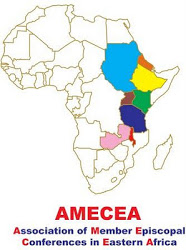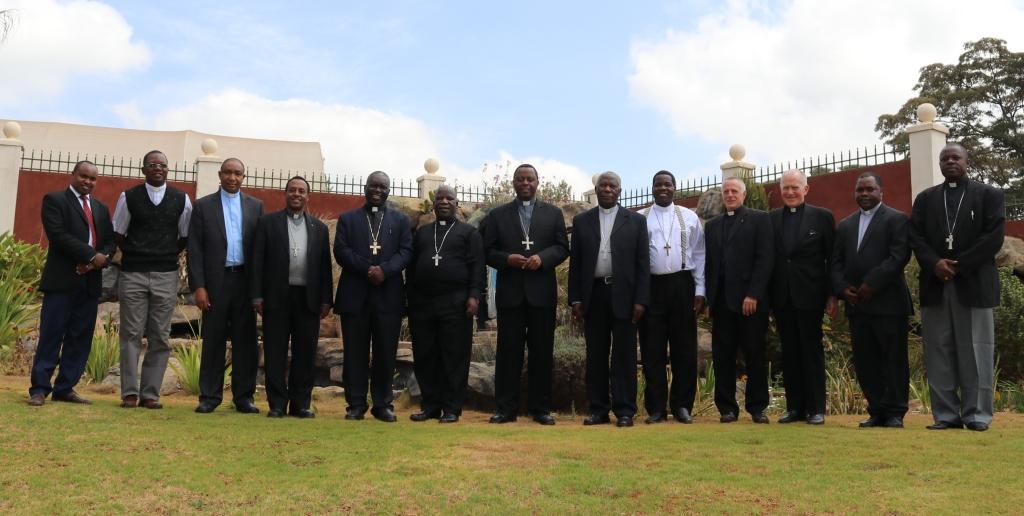AMECEA: “We will be Attentive To Contextual Details At The Summit,” Says AMECEA Vice Chairman

As days to the Papal Summit on Protection of Minors in Rome draws nearer, AMECEA Bishops have acknowledged that the Child Abuse is a reality in Africa albeit in broader perspective and that they are determined to use this opportunity to highlight the realities on the ground.
According to AMECEA Vice Chairman Most Rev. Thomas Luke Msusa SMM, the Bishops from the region have opted to look at the issue holistically in order to come up with measures that would address all kinds of abuse of minors and vulnerable adults.
“As Africans we cannot ignore the aspects of child abuse in our context and therefore we will present the issues holistically so that the world knows what exactly we are facing in Africa concerning this issue,” said Archbishop Msusa who is also President of Episcopal Conference of Malawi (ECM) and Archbishop of Blantyre.
He was speaking to AMECEA Online News in Nairobi where he was attending a preparatory meeting for all the Bishop Presidents/ Chairmen of the Episcopal Conferences of AMECEA Countries.
Archbishop Msusa cautioned against isolating the issue of abuse of minors as only being sexual abuse by the clergy. “Child abuse is a very sensitive issue, but for us in Africa, it goes beyond sexual abuse by the clergy. A lot is happening in Africa that poses great danger to the welfare of minors and these ought to be highlighted as well. We are talking about issues such as child soldiers; abuses happening in families where parents or close relatives are the perpetrators; abuses happening in schools where teachers and care-givers take advantages of the minors; we are talking about child labour and human trafficking where Africa is the target. We are talking about cultural factors such as female genital mutilation (FGM), early marriages, and the list goes on. These are proofs that child abuse in the African context is much broader and complex,” Archbishop Msusa highlighted.
He indicated that AMECEA Bishops wish to share what they see in their context and the most important for them is to find ways how Children can be protected from any type of abuse which threatens their plight, livelihood, innocence and their dignity.
“Sexual abuse is a grave issue that must not be taken lightly especially where the clergy are concerned. In our African context, this might just be a tiny fraction of the bigger problem. However, the question is, ‘How can we look at the issues holistically; how can we respond to those challenges?’
 “There are also issues of poverty that deny children basic necessities of life such as decent food, clothing, education and healthcare. The pandemic of HIV/AIDS which has left many children orphaned and are being taken care of by their elderly grandparents. In certain cases, children are taking over parental responsibility for their siblings. We must consider all these issues in our child safeguarding programs,” Archbishop Msusa elaborated.
“There are also issues of poverty that deny children basic necessities of life such as decent food, clothing, education and healthcare. The pandemic of HIV/AIDS which has left many children orphaned and are being taken care of by their elderly grandparents. In certain cases, children are taking over parental responsibility for their siblings. We must consider all these issues in our child safeguarding programs,” Archbishop Msusa elaborated.
The AMECEA Secretariat brought together all the Chairmen/ Presidents of Member Episcopal Conferences to a forum where they share their thoughts and experiences in a more collaborative and solidarity way ahead of the summit, which is scheduled for February 21-24. According to AMECEA Secretary General Rev. Fr. Anthony Makunde, the meeting has offered the Bishops a forum to brainstorm on the challenges of child safeguarding and abuses experienced in the entire region.
“We also thought that it is good for the presidents of AMECEA Conferences to come together to identify the areas where they think there are challenges in the region and in respective conferences. We thought of addressing the issues by looking at our cultural and social environment,” said Fr. Makunde adding that the meeting was coordinated by AMECEA Pastoral Department.
According to Rev. Fr. Joseph Healey, one of the moderators of the meeting, the bishops have drafted five short papers from an African perspective on Sexual Abuse, Physical Abuse, Emotional Abuse, Neglect and Exploitation which they perceive to be critical and cross-cutting agenda in the Region and in Africa as a whole.
∽End∽
By Pamela Adinda, AMECEA Online News


